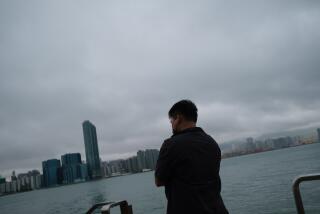Hong Kong’s Houdini of Democracy
- Share via
HONG KONG — I do hope the English appreciate all that Christopher Francis Patten, the last of history’s British colonial governors, who’s to return the glittering gem of Hong Kong to the Chinese come July, has done for Britain’s image. Thanks mainly to his political agility, Mother England, the longtime occupying power, looks to exit with head held high and to have left China, the incoming landlord, in something of a box. This is no minor achievement. History needs to award this clever career British politician a special entry in “Ripley’s Believe It or Not”. Or at least a footnote in Houdini’s Great Escapes. This is a truly clever man--the sort who could market a locust plague as a useful environmental correction, a Titanic disaster as a planned Extreme Adventure or a mortgage foreclosure as a humanitarian effort to help the poor confused widow get a handle on her finances. Patten, inheritor in 1992 of a colonial record a century and a half long and light years short of self-determination, pulled off the near-miracle of making the big bad colonialist look like the good guy. You think O.J. was tough to defend? That was nothing: Remember that little contretemps last century called the Opium War? Imperialist-power Britain bombarded China’s coastal cities with navy guns. The noble cause? The right to continue to peddle opium to the Chinese, with the result that by 1842, China had a drug habit as long as the Great Wall and Britain had Hong Kong as a spoil of war.
China has its own image problems with smaller neighbors like Taiwan and Tibet, of course. But when Patten began spray-painting Britain’s spotty record five years ago, Britain was in the position of championing precisely those individual, political and press rights that the British themselves had denied Hong Kong for the previous 150 years--when the world spotlight was pointed elsewhere. Now much of the world regards Mother England as the virtuous lady and the People’s Republic of China as the heavy.
This nimble about-face outfoxed slow-footed Beijing, because once the human rights bar was raised, China was put on notice not to lower it--or at least not to lower it below where it had been before Patten started doing his slick things. In 1995, for instance, the governor unilaterally organized elections for a British-created legislature whose members’ four-year terms would, by about two years, slide over past the July handover. Did I mention that Beijing was not very appreciative? It now calls the last British governor names like “prostitute,” descendant of “stinking colonialism” and, in one of those sublimely original propaganda-mill phrases that can only originate in China, “the sinner of a thousand millennia.”
All of which was music to Patten’s ears, of course, as it gave this silken-tongued Tory renewed standing back home and a sense of accomplishment here, in which he clearly reveled during an interview at Government House, the official mansion in central Hong Kong. Does he have any regrets about the ensuing damage to Sino-British relations? “What would have been the consequence of my doing what China wanted? No acrimony with China, a quiet life with China; bags of acrimony with Hong Kong,” he said, referring to the activist Democracy Movement of Martin Lee. “I could have governed Hong Kong in a state of endless knockdown, drag out arguments with the democrats and the majority of opinion here. I don’t think that would have been acceptable in domestic British politics; and it would have made Britain’s behavior here an issue in a lot of other people’s politics.” He then professed himself weary over continuing speculation that he’ll soon pop up in London as the resuscitator of the devastated Conservative Party.
Patten was not softening his line toward China in his last few weeks in office: “Chinese officials have got to relax about Hong Kong, trust Hong Kong, insulate Hong Kong from the political and commercial pressures in China. Nobody is suggesting that the right formula for governing is to be in a state of permanent guerrilla warfare with the sovereign power. But Hong Kong has to stand up for itself and be prepared to defend its autonomy.”
Right now, the bitterness in this crown colony between the British and Chinese is thicker than morning fog over Victoria Harbor. In fact, Patten and his successor, Tung Chee-hwa, the Chinese shipping tycoon, are not even on speaking terms; many ethnic Chinese here despise what they regard as Patten’s transparent grandstanding to the electorate back home. Undeterred, the governor bangs the ball right back into China’s court: “He [Tung] has a terrific hand to play. He is the first leader of Hong Kong in its new age, in the age of Chinese sovereignty, so he is, as it were, the guy in charge of this project. Nobody predicted, five years ago, that Hong Kong would be as strong as this economically and as stable as this socially. We’ve got pots of [reserve] money in the bank, and people now know what a fair election looks like.” Patten raised a final Balliol College eyebrow in Beijing’s direction on the human rights issue: “Rowing back, if that happens,” he said, referring to China’s evident intention to roll back individual and press freedoms, “people will be able to see the ripples in the water.” Well done, governor. Your move, Beijing.
More to Read
Sign up for Essential California
The most important California stories and recommendations in your inbox every morning.
You may occasionally receive promotional content from the Los Angeles Times.










